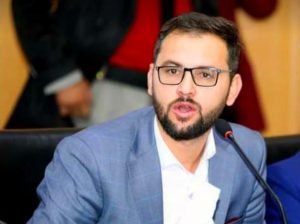Reflection of Voices on Women and Peace; An Attempt to Present the Narratives of Afghan Women

Since the beginning of the peace process in the country, one of the main concerns has been the uncertainty of the status of women’s rights in this process. The Civil Society and Human Rights Network has sought to create a fairly comprehensive account of the country’s women in a program entitled “Women and Peace: Between Hope and Fear,” which includes 100 interviews and 365 messages from citizens across the country.
Sayed Hussain Anosh, executive director of the Civil Society and Human Rights Network, said that their motivation for designing such a program was to achieve the best possible way to build a comprehensive narrative of Afghan women. “With the start of the peace talks, the question that came to our mind was how to create a narrative for the meaningful presence of women in the peace process. Nowadays, women do not usually write to reflect on their narratives. Nevertheless, this initiative brought them together to express their demands, and concerns on the peace talks through writing, and speeches” Anosh said.
CSHRN: What is the purpose of the Women and Peace initiative?
Anosh: The idea was to highlight the voices of Afghan women on the Afghan peace process. We attempted to strengthen the culture of dialogue to move forward to producing content, text, and narratives. Therefore, I view 100 interviews and 365 peace messages gathered and reached out widely to the public helped raise public awareness on the important role of women and strengthened their position in peace and conflict prevention.
CSHRN: How was effective the program?
Anosh: During the project, we were receiving hundreds of messages every day, people were expressing their interest to send us their messages and voices for circulation through CSHRN’s social media platforms. Due to a high number of messages, we could not respond to all; however, we did our best to collect and share most of them on our social media. The interviews were conducted with celebrities, women activists, civil society representatives, experts, and members of the Afghan negotiating team, which were widely published in the country’s leading newspapers and CSHRN’s social media.
CSHRN: How do you assess the progress of the peace talks?
Anosh: From the beginning of the talks, our concern has been about the framework and mechanisms of the peace negotiations. Second, the spike in violence without any sign of ceasefire has always frustrated us. Therefore, we stress the importance of dialogue as an alternative for killing to reach a political agreement.
CSHRN: Given the Taliban’s attitude towards women, will the peace talks result in a positive outcome?
Anosh: The Taliban’s behavior in the 1990s and afterward is in no way defensible. The question that now comes to mind is how to end the current conflict; through shelling or dialogue? I think the solution for reaching a political settlement is dialogue only. In doing so, I think the international community must also conditionally put their support behind these efforts and exert pressure on both parties to come to terms.
CSHRN: Will women’s presence in peace talks affect the Taliban’s views of women?
Anosh: Of course to some extent, and yet, the number of women negotiators is not enough. More women are needed to be included. Over the last twenty years, Afghan women succeeded to flourish in various areas, mainly in education, media, sport, politics, and the economy. So, their participation should preserve all these gains.
CSHRN: How will the presence of the Taliban in power affect women’s lives?
Anosh: We have always been worried about the implications of a possible peace deal that brings the Taliban to power or become part of the political structure to unduly influence women’s lives, and civil society as the latter supports neither the government nor the Taliban but democratic values and processes only. I think the work of civil society should not be restricted as it regularly monitors the function of the government and advocates for a quality life for citizens. Additionally, civil society organizations play critical roles in providing and supporting education, health, and other humanitarian assistance to the people.